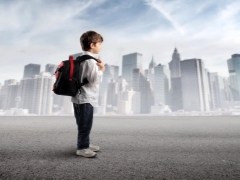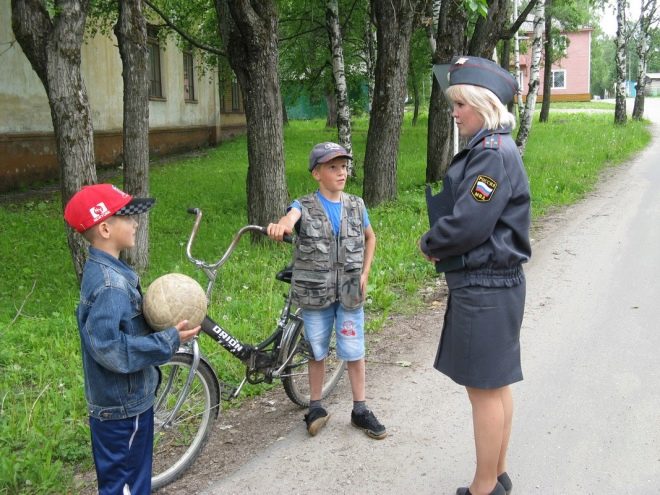Rules of conduct for schoolchildren in public places
Even the freest society always requires its members to adhere to certain rules of conduct in public places. Violation of the prescribed regulations can result in a condemnation from others and problems with the law. If adults are at least relatively familiar with this topic, for schoolchildren etiquette in public places can be something new.
Many children are not inclined to follow the rules because of their immature age, then parents should make every effort to make the child feel responsible for their behavior.
Not at home: basic principles
Each public place can have its own code of conduct, taking into account the specifics of people gathering here and their occupations. However, it does not interfere with the formulation of generalized rules that are relevant wherever there is a student. If there are specific rules of conduct in a given place, they must be observed.
In any situation, the culture of interaction with other people is extremely important.
Politeness forms an approving attitude from others, often avoids conflict. It should be expressed not only in the words “thank you” and “please,” but also in the absence of harsh words, as well as foul language. Should remember that all visitors to public institutions are equal. However, you should pay more attention to pensioners, the disabled, pregnant women and young children.
Other people's property, including public, can not be broken or damaged. Such actions are fraught with big problems with the owner of the damaged things, or even with law enforcement agencies. Damage can be considered and dirtying (in particular, using spray cans with paint). Even if the surface was used exclusively for artistic purposes, and everyone present, including adults, recognized the masterpiece in the drawing, the owner may not appreciate it. Do not litter or spit.
Children under the age of 16 should not be away from home after a certain time. This time is usually determined by each parents individually. Although there are recommendations of specialists who suggest not allowing independent walks of minors after 21-22 hours. Breaking this rule is not allowed.
For the sake of their own safety, children are not recommended to enter into conversation with strangers in public places. This rule does not prohibit young people to get to know each other.
But if an adult shows a clear desire to meet with the child, this should raise suspicion. It is completely unacceptable to go anywhere with such a person, even if he calls to a crowded place.
Rules of the road are not only for drivers and pedestrians, but also for young cyclists, as well as schoolchildren riding scooters, skateboards and other personal transport of this kind. Irresponsible behavior on or near the roadway threatens the violator with very serious consequences. You can not create emergency situations.
Violation of public order by children is as much a matter of jurisdiction as if adults had committed it. But parents can be held responsible for this if the child is under the age of 14. Drinking and smoking on the street is not recommended even for adults, and for children such entertainment is unacceptable in principle. You cannot pester passersby on the street, speak too loudly or laugh (especially at a later time).
Pay attention to your own behavior with fire and on the water. Fire is generally not a toy for children, especially near residential buildings or other buildings. Unaccompanied bathing is allowed only in specially adapted places. It is important to observe the condition that one of the group is always on the shore.
In public transport
In large cities, popular public places often have to travel by bus or other transport. It also has its own etiquette.
- When a woman or an elderly person is skipped ahead when boarding a bus, make room for a pensioner or a disabled person is a sign of a well-bred child. Pushing, getting into the transport out of turn is a characteristic feature of ignorance.
- To pay for travel is not just politeness, but a duty of any citizen, unless he is entitled to free travel. The driver or controller may not notice the stowaway, but vehicles travel regularly and look beautiful, thanks to paid tickets.
- In transport it is unacceptable to litter, spoil the interior and its parts. In addition, there is no need to disturb other people with loud conversations or laughter. It is permissible to use a gadget to listen to music, watch a movie or play games, but then it is advisable to use headphones.
Any extraneous factors distract passengers and the driver, and the health of dozens of people depends on his attentiveness.
Appearance and manners
The appearance of the student is unlikely to be the immediate cause of the conflict, but it can provoke ridicule or condemnation. As for manners, the “wrong” behavior can provoke others to the most unexpected reaction. It is enough to follow a few simple tips to avoid such situations.
- On the street you need to go out only in its best way: combed and neatly dressed.
- It is impolite to cough or sneeze at other people. Got sick - cover your mouth with your hand, but even if there is no disease, this recommendation remains relevant. With a cold, it is better not to sniff, but to use a handkerchief.
- I decided to eat in public - do it carefully and quietly. You should not attract the attention of loud champing or the look of a smeared face. The napkins will become an indispensable assistant in this situation.
- Everyone has the right to their own opinion, but one should not express it publicly in the presence of strangers. Someone may hurt such a point of view, then the result will be unpredictable.
Other rules
Finally, it is worth paying attention to a few tips that will help to form a positive opinion about yourself.
- If you need to enter the closed door, first knock: there may not be happy about the unexpected appearance.
- Whispering with other people is considered impolite: they may find that they are being discussed. It’s not a fact that strangers need to hear what you are talking about, but then at least you don’t need to look at them in the process of communication.
- When another person speaks, you do not need to interrupt him: you should let him speak and finish his thought. This applies to absolutely any interlocutors, including their own friends.
- An extremely impolite and even offensive gesture will turn its back on a person when he turns to you. This demonstrates neglect or unwillingness to communicate, which in itself can be perceived as an insult.
See how to teach children ethics in public places in the next video.



















